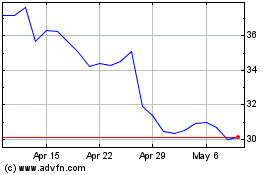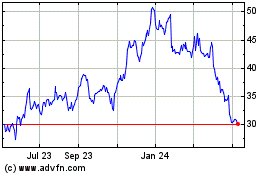Intel to Invest $50 Million in Quantum Computers
September 03 2015 - 3:33PM
Dow Jones News
By Don Clark
Intel Corp. is joining the race to develop quantum computers, a
long-discussed break from conventional electronics aimed at solving
problems that are far beyond the reach of today's hardware.
The chip giant said it is investing $50 million as part of a
10-year collaboration with QuTech, an institute in the Netherlands
formed in 2013 by Delft University of Technology and the Dutch
Organization for Applied Research. Intel also plans to provide its
own engineering resources to accelerate advancements in the
field.
Scientists have been trying to apply quantum physics to
computing for decades, with researchers at companies such as
International Business Machines Corp., Microsoft Corp. and Google
Inc. also actively working in the field.
The term quantum refers to the unusual properties of matter at
the subatomic scale, which may only be observable when materials
are cooled to temperatures approaching absolute zero, or minus 459
degrees Fahrenheit.
Conventional computers use binary digits, which express data as
either a 1 or 0. Researchers have been exploring alternatives using
quantum bits, or qubits, that can simultaneously represent a 1 and
0 at the same time.
A related goal is to make qubits reach what scientists call an
entangled state, acting like they are connected while remaining
physically apart. If that happens, proponents say quantum computers
could carry out many more calculations simultaneously than today's
fastest computers.
Intel's entry in the field is notable because of its financial
heft and vested interest in conventional computing technology. The
company, which spent $11.5 billion on research and development in
2014, focuses heavily on production processes that pack more
semiconductors onto silicon chips.
But progress through miniaturization alone is getting harder,
and some day may run out of steam altogether. Intel, which had long
stayed on a two-year cadence for introducing new production
recipes, in July said the future pattern would more likely be on
the order of 2 1/2 years.
Mike Mayberry, a vice president who helps lead Intel's research
into future technologies, is wading into the field only after
seeing recent signs of progress in quantum technology. In addition,
he said Intel sees ways it could help tackle remaining hurdles,
such as processing signals generated by qubits as well as
correcting errors caused by electrical interference.
"We came to the realization that the rate of progress was
limited by some things we thought Intel could add value to," Mr.
Mayberry said.
Chad Rigetti, a former IBM researcher who now heads a
quantum-computing startup called Rigetti Computing, said Intel is
arriving late to quantum computing and could use the QuTech
partnership to help catch up. "Intel needs to get involved," he
said.
Intel and QuTech are particularly interested in applying quantum
technology to problems such as simulating the structure and
behavior of molecules in ways that aren't feasible now. "There are
many materials that are too complex for an ordinary computer to
help us understand their properties," said Lieven Vandersypen, a
lead scientist at QuTech.
Armed with such knowledge, he said, researchers could work on
superconducting materials that could carry electricity much more
efficiently over long distances. Another closely watched
application for quantum computers is making and breaking codes, for
commercial and national-security purposes, Mr. Mayberry said.
Write to Don Clark at don.clark@wsj.com
Subscribe to WSJ: http://online.wsj.com?mod=djnwires
(END) Dow Jones Newswires
September 03, 2015 15:18 ET (19:18 GMT)
Copyright (c) 2015 Dow Jones & Company, Inc.
Intel (NASDAQ:INTC)
Historical Stock Chart
From Mar 2024 to Apr 2024

Intel (NASDAQ:INTC)
Historical Stock Chart
From Apr 2023 to Apr 2024
